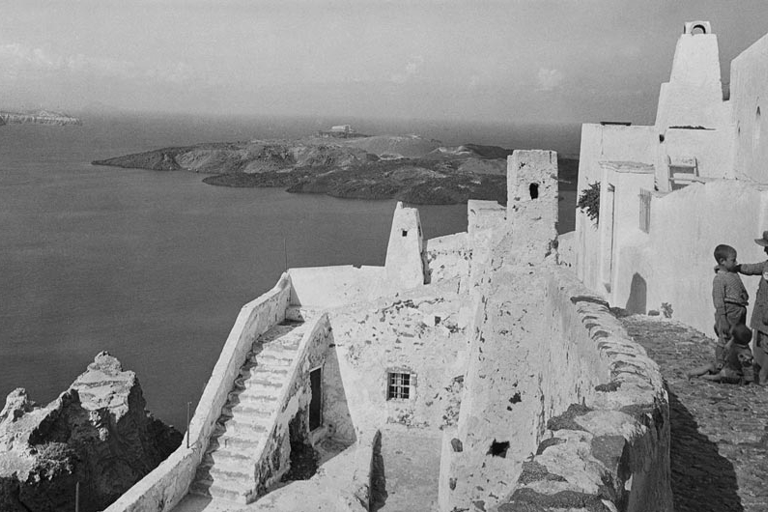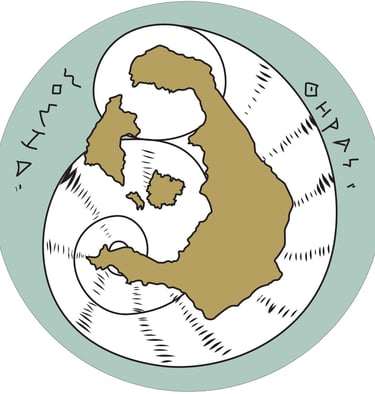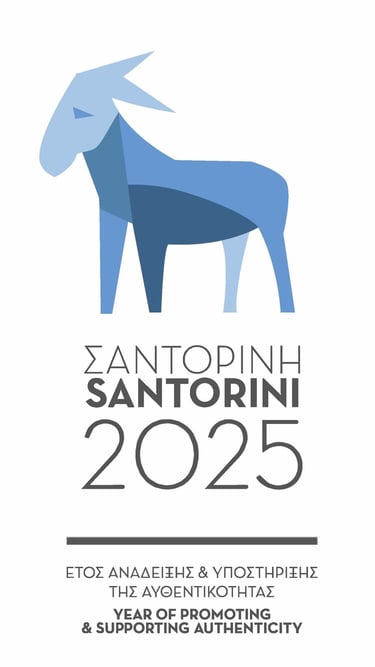About 100 years ago, photographer Elli Souyioultzoglou-Seraidari, –better known by her professional name of Nelly's, visited Santorini and captured the daily life and landscapes of the island with her camera. Her black-and-white photographs capture the uniqueness of the Aegean landscape, playing with colours, light, and the geometry of volumes.
Nelly's is considered one of the first Greek photographers to have dealt extensively with landscape photography and is regarded by many scholars as the starting point of modern Greek landscape photography. The section on Santorini shows the now famous picturesque landmarks of the islands, with their white chapels and windmills, which would later become globally recognizable symbols of the Aegean landscape.
The play of volumes, the highlighting of forms under the intense light of the Aegean, the combination of plastic form and simple geometry, the movement and play of light on white surfaces, rough stones, and ash, as well as the human scale, are key features of her work.
It is noteworthy that Nelly's visit to Santorini coincided with the discovery of Cycladic architecture by the pioneers of modernism. The charm of the island landscape that influenced Le Corbusier and other important architects of the time was captured in a unique way by Nelly's lens, creating a valuable testimony to the evolution of aesthetic perception in the 20th century. Unlike her contemporary European photographers such as Herbert List or Henri Cartier-Bresson, who sought the "exotic" element in Greek landscapes, Nelly's approached the place with a deep understanding of its cultural identity.
From her photographic journeys in Santorini, where she spent several family holidays during the summers (1928-1932), Nelly's gathered a wealth of photographic material based on experiential references and appreciation of the landscape. She walked along the cliffs of caldera, highlighting the awe-inspiring volcanic landscape. She stood in front of Skaros, capturing the vertical layers of the rocks with the texture and colors of the geological formations. She walked on the black beach of Kamari and observed the fluid continuity of land and sea. She followed the path to Profitis Ilias and captured the expanse and vastness of the landscape, and she also wandered the cobbled streets of Pyrgos and Fira, where she recorded the life of human presence and absence.
While Nelly's work gained publicity through different themes of her work, her photographs of Santorini became more widely known for the first time in 1987, when Dimitris Tsitouras edited the album "Nelly's, Santorini 1925-1930," which was updated and re-published in 2015.
In 1984, the photographer donated her entire archive, comprising over 50,000 negatives and 20,000 original prints, to the Benaki Museum Photographic Archives, contributing significantly to the preservation and dissemination of Greek photographic heritage.
In the summer of 2025, residents and visitors to Santorini will have the opportunity to see these images in an exhibition co-organized by the Benaki Museum and the KASTELANA Photography Centre.
As part of the exhibition, events and discussions on Nelly's work and the role of photography in the study of cultural heritage will be held in August and September, as well as workshops for children and adults.
EXHIBITION CURATORS: Aliki Tsirigialou, Head of the Benaki Museum Photographic Archives, and Tonia Noussia, Architect – Museologist, Founder of the KASTELANA Photography Centre
The exhibition is under the auspices of the Municipality of Thira and is part of the Municipality of Thira's initiative "Santorini 2025: Year of Promotion and Support of Authenticity."
The exhibition will be open daily, except Wednesdays, from 10:00 to 20:00, from August 10 to October 20, 2025. Admission will be free for visitors.



10 August 2025 - 20 October 2025







PART OF THE
UNDER THE AUSPICES OF
COMMUNICATION SPONSORS
HOSPITALITY SPONSORS
EXHIBITION
Nelly's: Santorini between the wars
Thursday - Tuesday 10:00-20:00 Free Entry
EXHIBITION CURATORS : Aliki Tsirgialou και Tonia Noussia




